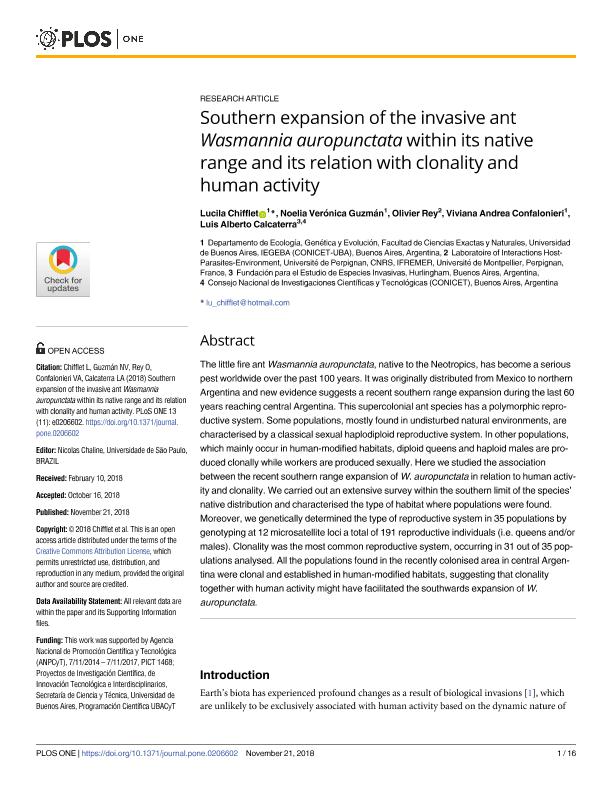Artículo
Southern expansion of the invasive ant Wasmannia auropunctata within its native range and its relation with clonality and human activity
Chifflet, Lucila ; Guzman, Noelia Veronica
; Guzman, Noelia Veronica ; Rey, Oliver; Confalonieri, Viviana Andrea
; Rey, Oliver; Confalonieri, Viviana Andrea ; Calcaterra, Luis Alberto
; Calcaterra, Luis Alberto
 ; Guzman, Noelia Veronica
; Guzman, Noelia Veronica ; Rey, Oliver; Confalonieri, Viviana Andrea
; Rey, Oliver; Confalonieri, Viviana Andrea ; Calcaterra, Luis Alberto
; Calcaterra, Luis Alberto
Fecha de publicación:
11/2018
Editorial:
Public Library of Science
Revista:
Plos One
ISSN:
1932-6203
Idioma:
Inglés
Tipo de recurso:
Artículo publicado
Clasificación temática:
Resumen
The little fire ant Wasmannia auropunctata, native to the Neotropics, has become a serious pest worldwide over the past 100 years. It was originally distributed from Mexico to northern Argentina and new evidence suggests a recent southern range expansion during the last 60 years reaching central Argentina. This supercolonial ant species has a polymorphic reproductive system. Some populations, mostly found in undisturbed natural environments, are characterised by a classical sexual haplodiploid reproductive system. In other populations, which mainly occur in human-modified habitats, diploid queens and haploid males are produced clonally while workers are produced sexually. Here we studied the association between the recent southern range expansion of W. auropunctata in relation to human activity and clonality. We carried out an extensive survey within the southern limit of the species’ native distribution and characterised the type of habitat where populations were found. Moreover, we genetically determined the type of reproductive system in 35 populations by genotyping at 12 microsatellite loci a total of 191 reproductive individuals (i.e. queens and/or males). Clonality was the most common reproductive system, occurring in 31 out of 35 populations analysed. All the populations found in the recently colonised area in central Argentina were clonal and established in human-modified habitats, suggesting that clonality together with human activity might have facilitated the southwards expansion of W. auropunctata.
Palabras clave:
invasive ant
,
pest
,
polymorphic reproductive system
Archivos asociados
Licencia
Identificadores
Colecciones
Articulos(IEGEBA)
Articulos de INSTITUTO DE ECOLOGIA, GENETICA Y EVOLUCION DE BS. AS
Articulos de INSTITUTO DE ECOLOGIA, GENETICA Y EVOLUCION DE BS. AS
Articulos(SEDE CENTRAL)
Articulos de SEDE CENTRAL
Articulos de SEDE CENTRAL
Citación
Chifflet, Lucila; Guzman, Noelia Veronica; Rey, Oliver; Confalonieri, Viviana Andrea; Calcaterra, Luis Alberto; Southern expansion of the invasive ant Wasmannia auropunctata within its native range and its relation with clonality and human activity; Public Library of Science; Plos One; 13; 11; 11-2018; 1-16
Compartir
Altmétricas



